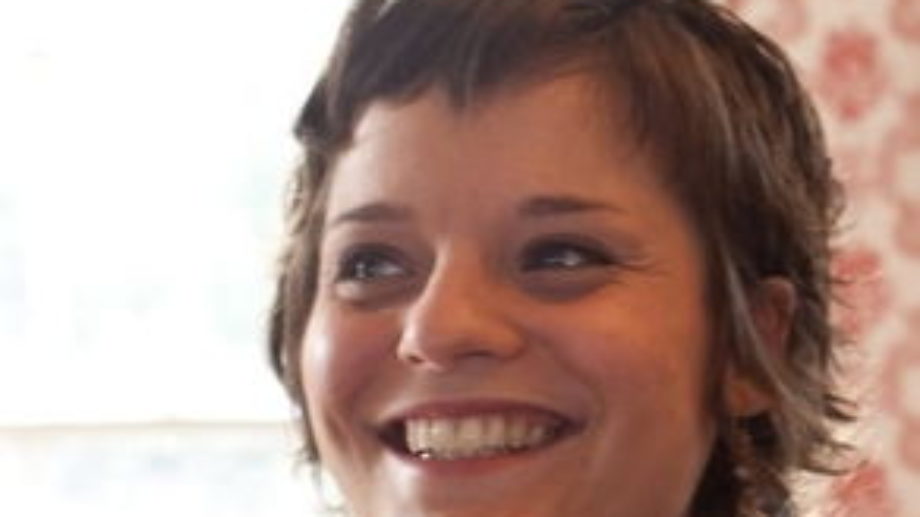
Our Nixon filmmaker Penny Lane. Photo credit: Les Stone
The formula seems simple. Take pre-existing material and piece it together into a narrative that gives a new perspective on the subject depicted. The trick, however, is finding and curating that material and then weaving it into a unique and fascinating chronicle. Still early in her filmmaking career, Our Nixon director Penny Lane, along with her producing partner Brian L. Frye, are proving to be budding masters of the form. In their award-winning new film, which will close New Directors/New Films this weekend, they take home movie footage shot by close aides of the 37th President of the United States and craft a new and surprisingly personal story of a leader whose tenure as the leader of the free world from 1969 to 1974 was one of the most scrutinized of the 20th century.
Lane and Frye are offspring of a generation that felt the immediate impact of one of America's most controversial leaders. They became interested in Nixon after learning that a massive archive of home video made by Nixon's own inner circle was stashed away in an archive, but had not yet been viewed. The budding filmmakers saw an opportunity just waiting to be unearthed. “Brian and I know a lot of people who are involved in the world of film archive and film preservation,” said Lane. “People knew about the movie footage, but we were the first people to actually pay for access copies. The material was there; it was in the public domain by congressional mandate. In fact, everything from the Nixon White House that was confiscated became public domain. But it was just a matter of paying for the access copies, which is a lot of money.”
What they found was a rich, up-close account of a White House run by a group of young, idealistic and dedicated servants. White House Chief of Staff H.R. Haldeman and his colleagues John Ehrlichman and Dwight Chapin obsessively documented their time with to the President. Their personal movies create a rare personal look at what it's like to be just feet away from the most powerful man in the world. Shot on Super 8 home movie cameras, the FBI seized the material during the Watergate investigation and it was virtually forgotten for almost four decades. The trio were later jailed in the aftermath of the Watergate scandal.

A scene from Our Nixon. Photo credit: Les Stone
“For me it's considering history in a way primary sources let you think about it,” said Lane, who acknowledged that prior to doing research for Our Nixon, her knowledge about him was mostly formulated from Oliver Stone's 1995 film Nixon starring Anthony Hopkins. “It makes you think about how history gets its meaning and who writes it. Our whole film is about people fighting over the meaning of events—what happens and why it happens, though the question is not exactly answered. A lot of people offer different perspectives on it. It's a way of thinking about history and acknowledging the meta level of how history is created.”
Lane's initial foray into curated storytelling came in the form of her 2004 short documentary, We Are The Littletons: A True Story, which presents a tangled portrait of Eve Portia Littleton Rodriguez, an artist who had “movie star good looks” but was mysteriously banished from her model American family. “I was house sitting and discovered all these artifacts like birthday cards, letters and diaries and things and constructed a story about this family out of those found objects,” said Lane, describing how she created a cinematic collage of this family after digging below the surface. “I'm much more of a person who likes to curate things that already exist than someone who creates new images.”
Her first feature-length film, Our Nixon, will undoubtedly have a long festival run post-ND/NF. But while she'll likely continue to be on the road with that film, Lane is also busy taking on new subjects, piecing together elements on two new projects. She and Frye are currently working on The Rules of Evidence, which explores the use of motion pictures as evidence in court rooms. “It's very early in development, but we're excited about it,” she said. Lane is also working on another project, with the working title Nuts, about a famous 1920s con man who claimed to have a cure for impotence.
“It was a surgical cure for impotence involving planting goat testicles into men,” Lane explained. “Again, it will be based on years and years of researching archival material on my part. I'm flying all over the country and learning about this person. He's been forgotten, but he was very famous at the time. And that's the kind of person you want to make a movie about.”
Discover is a new weekly column devoted to spotlighting rising cinematic talent—from filmmakers to actors and beyond—whose work is appearing at Film Society of Lincoln Center or in festivals and theaters around the world!



